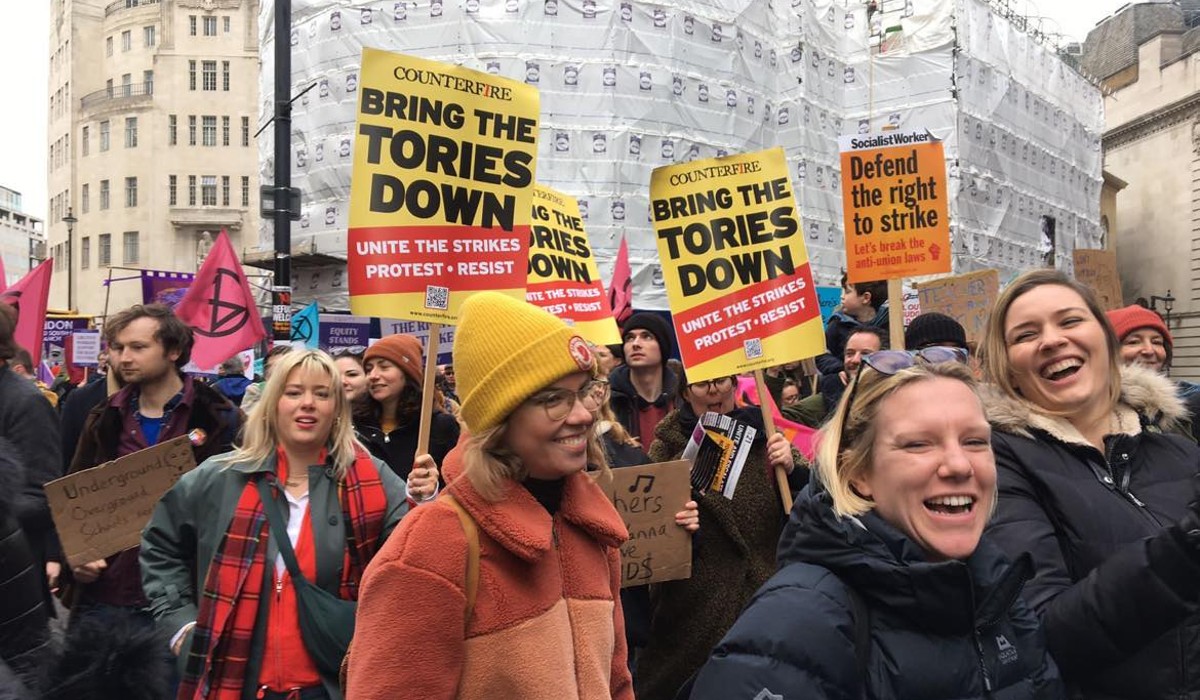 1 February London demonstration. Photo: Cici Washburn
1 February London demonstration. Photo: Cici Washburn
A wave of strikes shook Britain today – and Counterfire reporters were there to tell the tale
It was obvious even an hour before the London march of strikers was due to assemble that it was going to be big. Tubes and buses – busier than usual because of the rail strikes – carried teachers, children, parents, lecturers, civil servants, into the heart of the city, many of them carrying homemade placards berating the Tory government and demanding more money for public services, especially education.
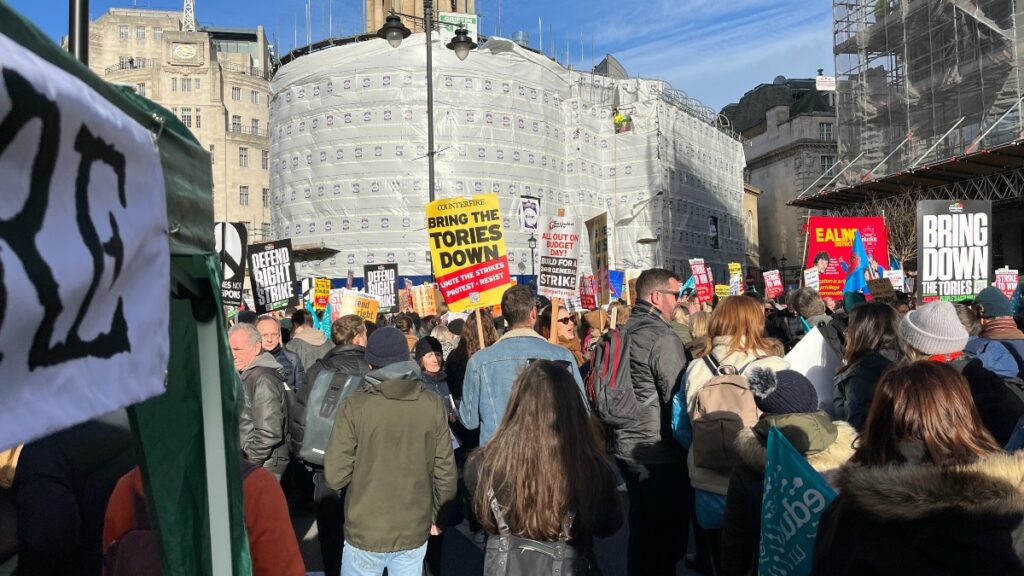
Striking teachers and their families were the backbone of this demo, called by London region of the NEU and backed by London region of the academics’ and lecturers’ union, UCU. The size was enormous for a weekday regional demo, running to many tens of thousands. It was one of the largest weekday demos in London for years. Big contingents from local borough teaching associations poured onto the streets, joined by strikers from other unions, and by a range of people from pensioners to students who supported the action.
The demo represented the pinnacle of the strike wave so far, with around half a million in dispute across the country, and with demonstrations in over 100 towns and cities of strikers and supporters. This is the first day of the teachers’ strike, and no politician can have missed the huge crowds in Whitehall. Even Keir Starmer may have to put up with more of his MPs joining picket lines. More strikers join the fray this month, with health workers out again next week, and firefighters due to take action. The teachers’ union has been strengthened by its position during covid lockdowns, when it refused to bow to government pressure to keep schools open. Now it is demanding fair pay and conditions for frontline workers like them, and for a properly funded education system.
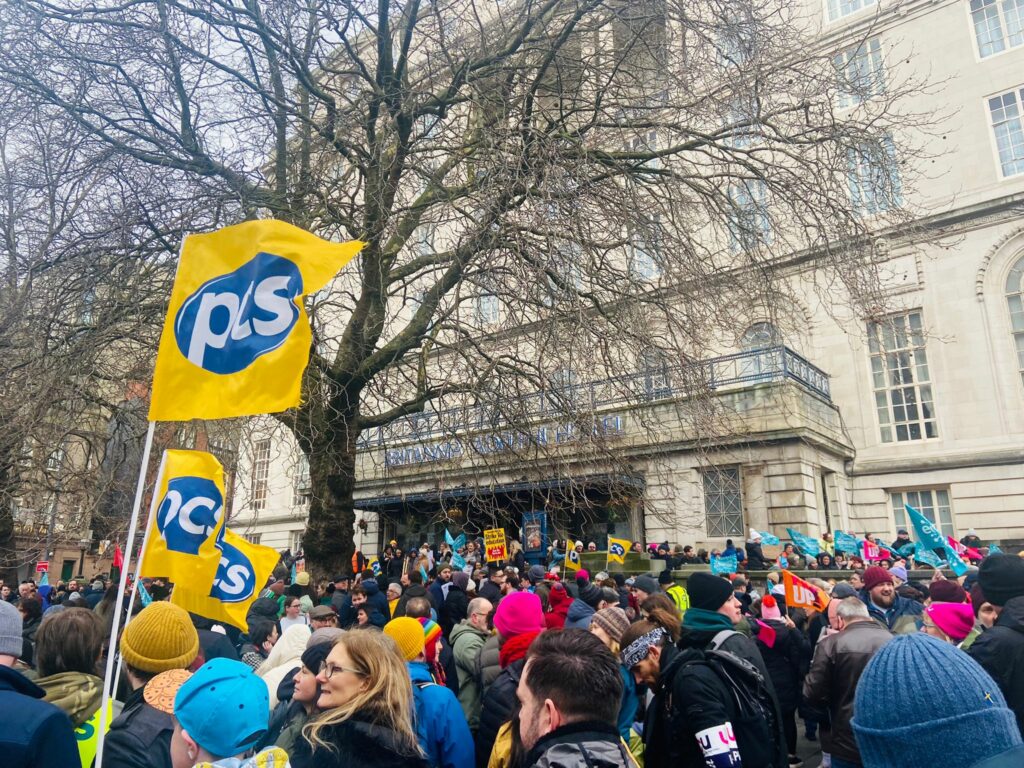
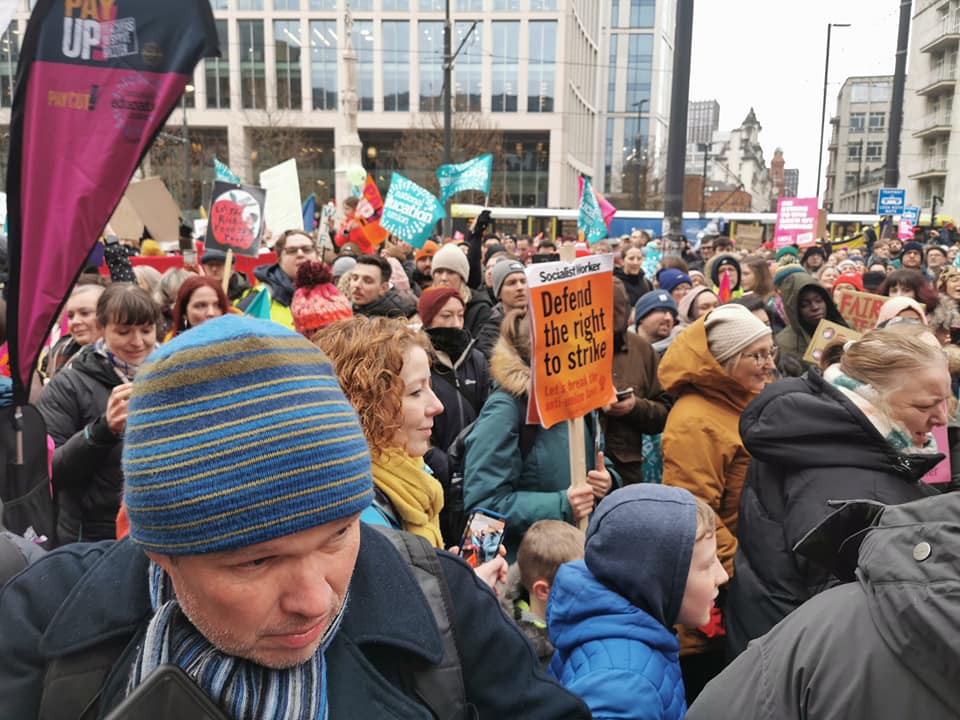
Strikers came together in massive demonstrations in other major cities. In Liverpool between 5000 and 7000 turned the plateau at the Metropolitan Cathedral into a sea of PSC, GMB, and NEU flags. The march set of for the Adelphi Hotel to chants of ‘The workers united with never be defeated’. An indoor rally was planned at the hotel but it was impossible for the volume of people to fit in to the building. Public support was overwhelming. ‘It’s brilliant’ one striker said, ‘This government has been running rough shod for far too long. And it’s not only these industries on strike today, it’s across the board. They’re crippling people, and we can’t take any more’.
Police estimated 5,000 marched in Newcastle, making it an exceptional demonstration for a weekday in the city. Speakers from across the union movement were cheered wildly and the NEU’s speaker Daniel Kebede caught the mood in his speech when he said, ‘We want a school system that is fully funded. We want every child to have a full belly and we want to return joy and happiness to our classrooms. Together we are strong. We can build a society in which every child can flourish’.
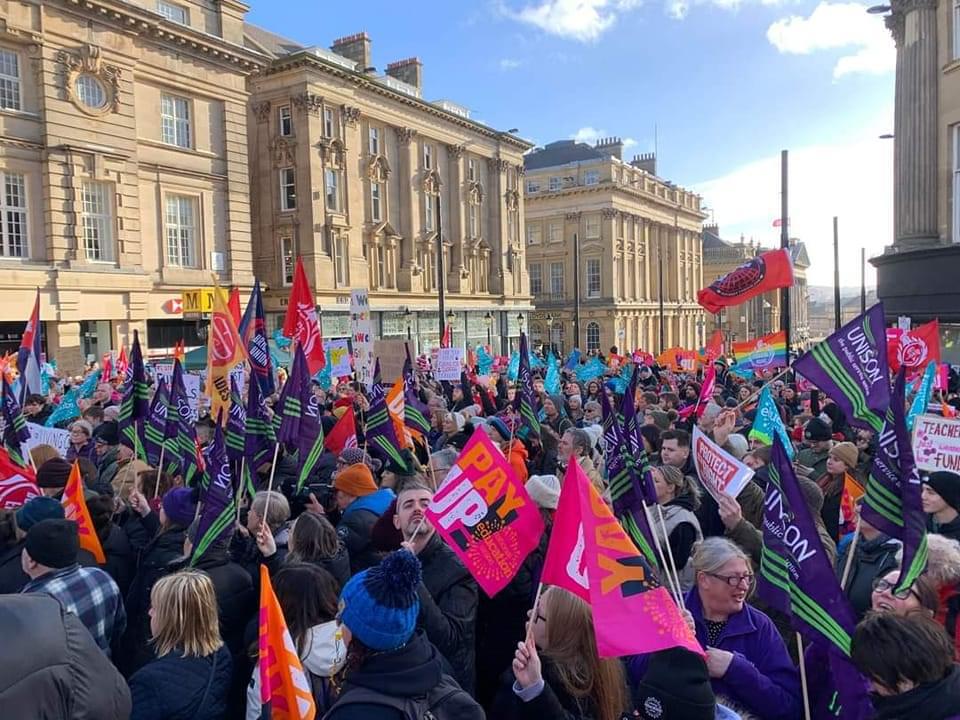
In Bristol an estimated 9,000 marched. In Birmingham there were 3,000, in Coventry 2,000. In Sheffield there were 6,000, the vast majority young teachers many of whom had organised their first picket lines that morning. There was an impressive contingent of firefighters and a very big UCU bloc. Every speaker who called for the business model of education to be dismantled received massive cheers. Activists felt this is a game changer in the local labour movement. Counterfire members said the free paper went like wildfire.
Even though teachers weren’t on strike in Glasgow, hundreds of lecturers and civil servants gathered in the centre of the city and were joined by climate activists showing solidarity. St Peter’s Square in central Manchester was completely full by midday, in fact the crowds tailed back into Oxford Road. The demonstration went way beyond the established left but the mood was militant and loud. What was noticeable was a sense of confidence amongst the strikers. The speeches that got the biggest cheers were the ones that talked about strengthening the links between the different groups of workers. And ones that called for bringing down the government.
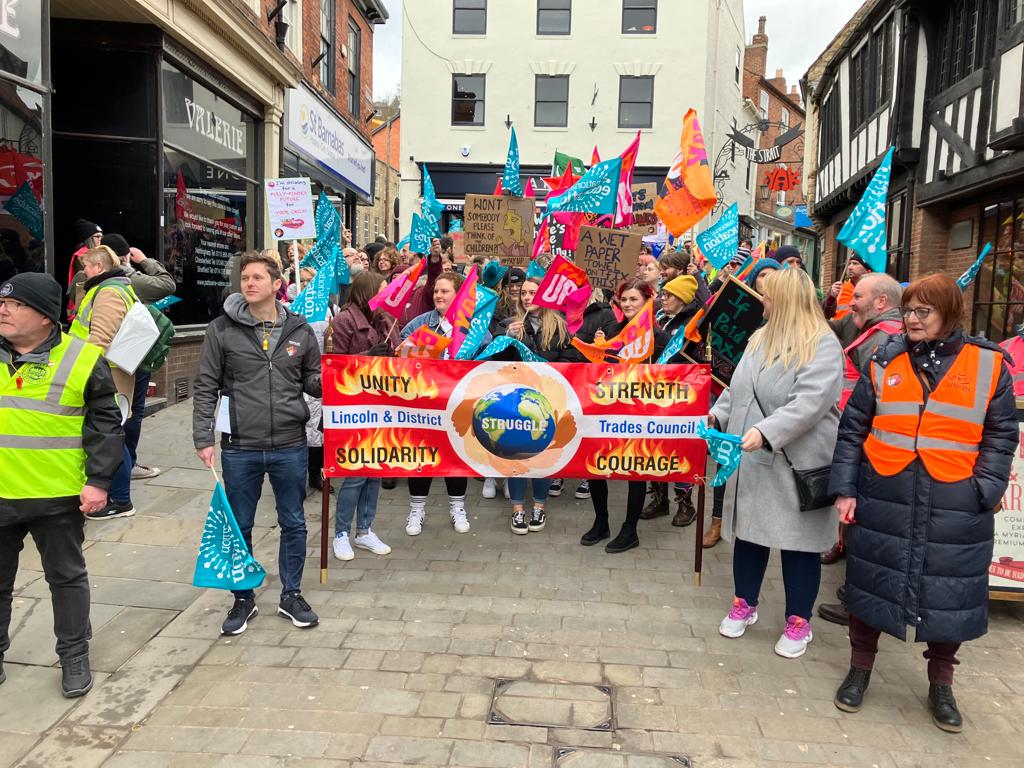
There were protests in smaller towns and cities up and down the country. So 7,000 gathered in a huge protest in Oxford, 3,000 marched in Brighton. 500 marched in Leamington. Around 300 attended the Hastings strike rally with speakers from the NEU, RCN, FBU, PCS and other unions, all singing from the same song sheet of solidarity, unity and defiance of the government. At the lively rally loads of school children turned up for some vital, extra-curricular, lessons. A similar number protested through Colchester where there around 60 people on all three university pickets. Over 200 strikers and supporters marched through the centre of Lincoln behind the trades council banner. Speakers from across the union movement underlined the need for more solidarity, and better communication and coordination locally and nationally. There was also a lot of criticism of the current Labour party’s attitude to the strikes and their demands, and a general feeling that Starmer will be facing trouble if and when he gets elected.
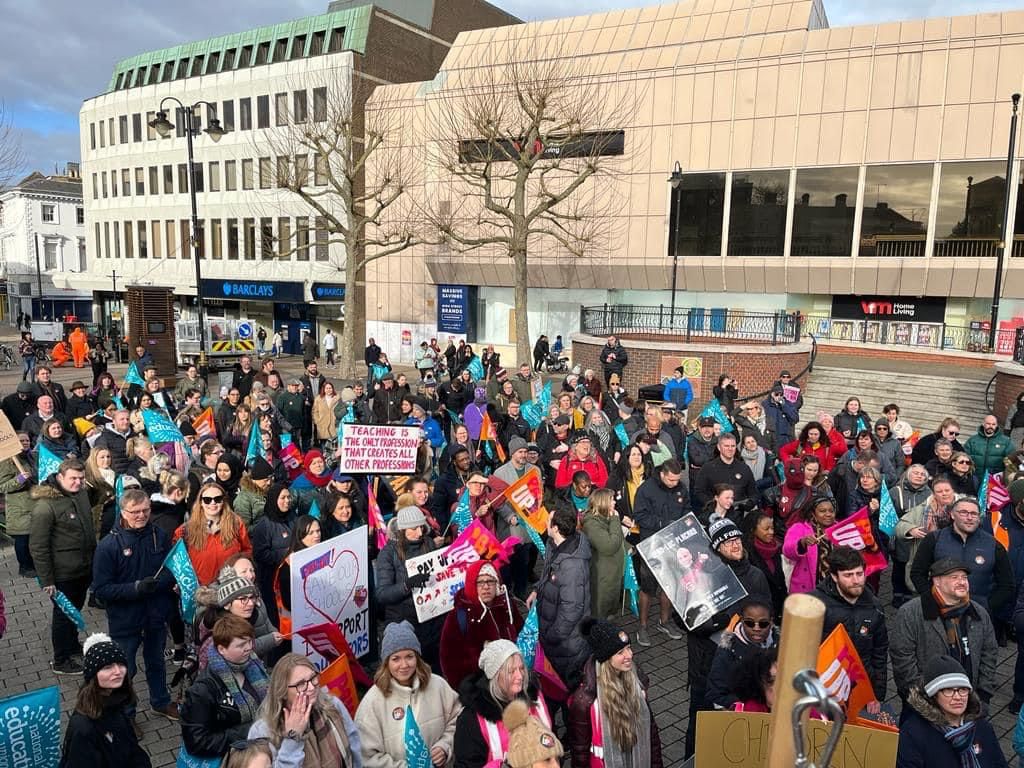
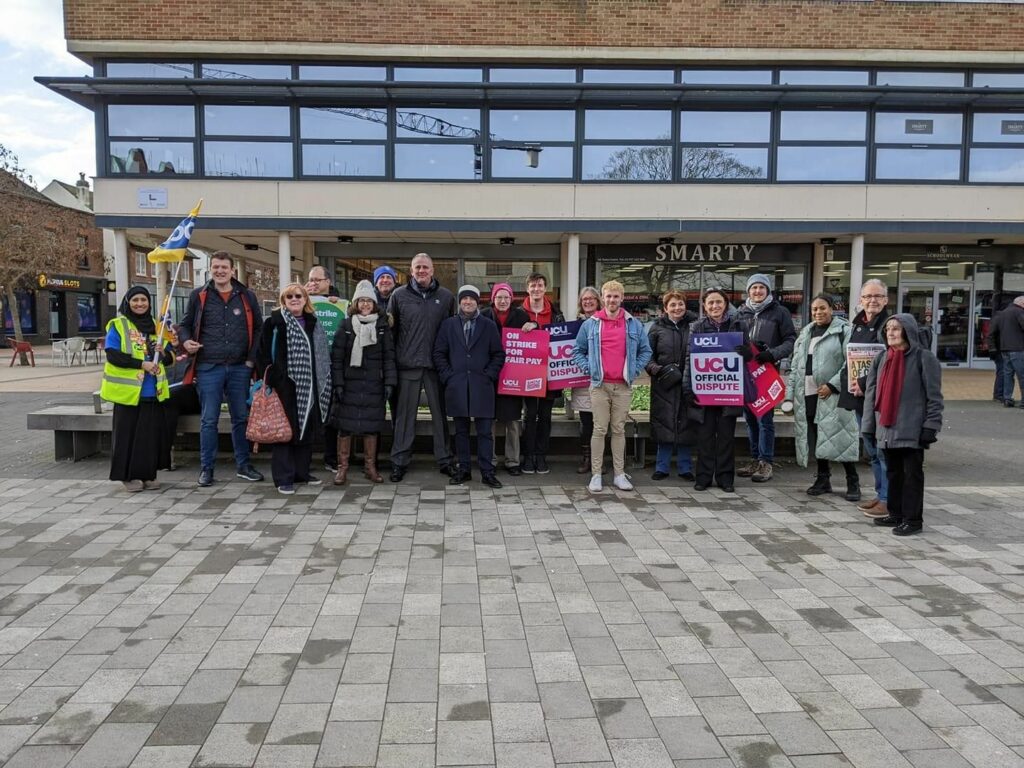
Around 200 gathered in Slough for a lively rally and 50 people turned up to a strike support protest in the small town of Hatfield. In Crewe the trades council and the local People’s Assembly co-organised a demo outside MP Kieran Mullan’s office. Delegations from the NEU, ASLEF, and the RMT joined the march which started at Crewe station and headed into the town centre before ending outside the Tory MP’s office, where the angry crowd was inspired by speeches from a string of strikers.
As today proved, coordinated strikes make perfect sense because they show our power and organisation. We need more of them, in the NHS, education, transport, and across the whole economy. This government is corrupt and dishonest, it hopes to ride out the strikes until workers get tired and the public disgruntled. So far that isn’t happening, because millions of people in Britain can see that their fight is for all of us, and that if they win, we all win. Conversely, if the government defeats groups of workers, and pushes through its vicious anti-union laws, then we will all face worse conditions.
That’s why we should see today as a new phase of an ever-growing movement across the working class, which wins the demands of the strikers concerned, but which also campaigns for a more equal and fairer society, based on principles of collectivity and cooperation, not competition.

Join Revolution! May Day weekender in London
The world is changing fast. From tariffs and trade wars to the continuing genocide in Gaza to Starmer’s austerity 2.0.
Revolution! on Saturday 3 – Sunday 4 May brings together leading activists and authors to discuss the key questions of the moment and chart a strategy for the left.

